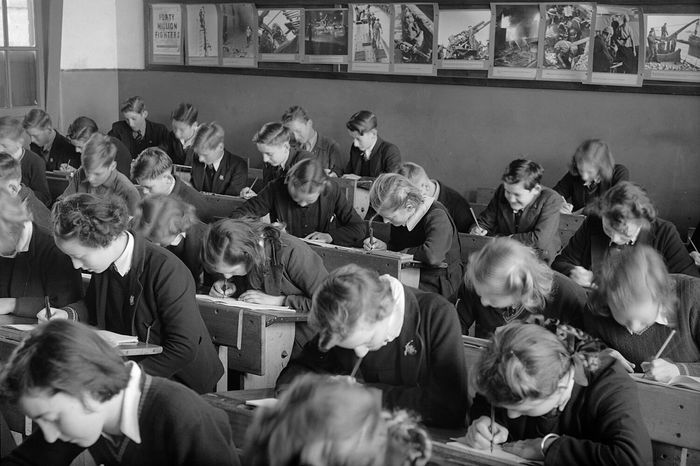We need to rethink how we view school privilege
We need to stop pretending that all grammar schools are meritocratic alternatives to private schools, argues Eliza Ousey

“I went to a grammar school, actually!” This phrase, like no other, dominated my fresher’s week. The implication: “I’m not posh! I promise! I went to a state school!” In all cases of this weird reverse-Saltburn, the speaker owned a pony, or maybe a yacht.
I am obviously exaggerating. But, this kind of claim — middle-class grammar school student effusively denies class privilege — came up time and time again. In the panic of freshers week, the widely-held belief seemed to be that appearing privileged would harm your social prospects, however weak the facade of the opposite — denying it outright — came to be.
In 2023, 19.1% of the students accepted to Cambridge were from UK grammar schools, whilst only around 5% of UK schools are grammar schools. On a basic level, this statistic seems fair. Given that grammar schools take in the most able students in an area, it makes sense that more of them would get into Cambridge. One might even consider it refreshing, to see the success of such state schools at an institution so notoriously the dominion of the privately educated.
The reality is not that simple. I went to grammar school myself; in my experience, it had everything to do with class and income. Those students who “only” went to a grammar school were backed up by a system arguably often as wealth-based as their private school counterparts.
“in my experience, it had everything to do with class and income”
The 11+ grammar school entrance exam is intended as an ‘unrevisable’ test, with verbal and non-verbal reasoning sections designed to measure IQ. Yet, in my area of Manchester and across the country, parents pay for private tutors for years to coach their children. Prices start at about £20 an hour, but some commenters on Mumsnet (mostly from London) admit to paying £80. A year and a half of weekly tuition, at this rate, would set you back over £6,000. It works, too. I had a tutor; I ended up passing the 11+ by 16 marks and likely wouldn’t have gotten in without one.
Technically, anyone can get into grammar school. The 11+ is free, and you don’t need a tutor to prepare for it. It does help, though. 11+ tuition is a huge industry in my area, proof that the “fair” selective system can, essentially, be invested in by those who can afford it.
The impact of this is clear. Research conducted by the BBC last year, based on DfE data, found that in a quarter of grammar schools less than 5% of students were eligible for free school meals, as opposed to 22.5% of children overall. The research also found that, although some schools had attempted to change their admissions criteria in favour of lower-income families, this had had little positive effect.
Don’t get me wrong, I loved school. But obviously I did. Our music department was well sustained because enough students had private lessons. There were regular trips abroad, because enough families would pay for them. Teachers tended to stay on longer, making our education more consistent than at neighbouring non-selective schools. On top of this, there was a shared confidence, which comes from telling a group of eleven year olds that they are the clever ones. By the time it came to university applications, I could see nothing stopping me from applying to Cambridge.
“the ‘fair’ selective system can, essentially, be invested in by those who can afford it”
Yes, schools vary, and going to a grammar school doesn’t guarantee you an easy ride to university. In any case, getting to Oxbridge is a rigorous process that requires academic effort. I also think it’s safe to say that a larger-than-average proportion of grammar school students had the resources to make that effort. In many ways, the Cambridge admissions process reminded me of the 11+: though supposedly a meritocratic system designed to give students equal opportunity, money helps.
To its credit, the university has recently acknowledged that “rising state school admissions” does not necessarily mean inclusion. It is scrapping its blanket “state school target” (69%) in favour of a multifaceted approach, which will focus on factors such as individual means and school type. For once, its student base needs to follow suit, in colloquially acknowledging that schooling is more nuanced than private means privileged, state means not. I don’t know what drives this desire not to be seen as posh, that I’ve seen again and again in Cambridge circles. Until it shifts, our collective perception of what fairness and inclusivity is will remain skewed.
This freshers week, think critically. Were you actually at any disadvantage because you didn’t go to private school? I know that I wasn’t. No one is going to begrudge you because you admit to your privilege — heck, you’re part of a majority at Cambridge — but you aren’t doing yourself, or anyone else, any favours by trying to deny it.
 Features / Should I stay or should I go? Cambridge students and alumni reflect on how their memories stay with them15 December 2025
Features / Should I stay or should I go? Cambridge students and alumni reflect on how their memories stay with them15 December 2025 News / Cambridge study finds students learn better with notes than AI13 December 2025
News / Cambridge study finds students learn better with notes than AI13 December 2025 Comment / The magic of an eight-week term15 December 2025
Comment / The magic of an eight-week term15 December 2025 News / News In Brief: Michaelmas marriages, monogamous mammals, and messaging manipulation15 December 2025
News / News In Brief: Michaelmas marriages, monogamous mammals, and messaging manipulation15 December 2025 News / Uni Scout and Guide Club affirms trans inclusion 12 December 2025
News / Uni Scout and Guide Club affirms trans inclusion 12 December 2025










